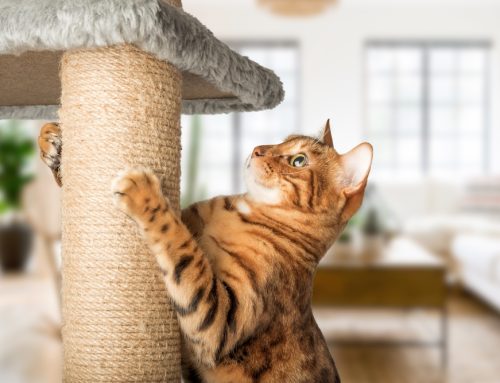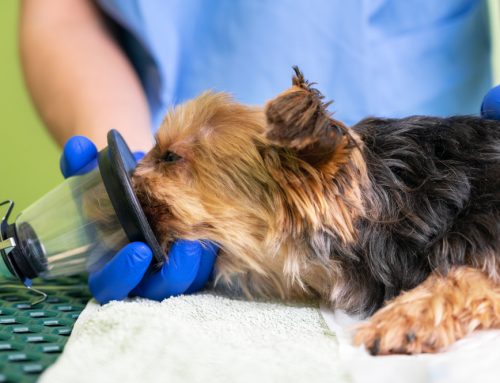A heartworm is a dangerous parasite that causes life-threatening disease in pets from coast to coast. Although the mosquitoes that transmit heartworm larvae thrive in damp, humid environments, Arizona pets are still at risk. How great is your pet’s risk? You may wonder whether certain aspects of your pet’s lifestyle make them more likely to contract heartworm disease, or perhaps exclude them altogether. To help you assess your pet’s risk, let’s look at three different pets. Can you select the pet who has no risk of contracting heartworm disease?
Pet #1: Princess
Princess is a 3-year-old miniature Yorkshire terrier who lives in an apartment building with her elderly owner. Although she enjoys breathing in fresh air from open windows, Princess rarely steps a paw outside, and goes to the bathroom on an indoor patch of artificial grass. She shudders to think of the outdoor dangers awaiting a posh pooch like herself, and is content to curl up on her owner’s lap and nap away the afternoon.
Pet #2: Jake
Jake is a 6-month-old husky mix who loves everything about being outside. He often goes hunting and camping, and spends weekends roaming the woods, rolling in the grass, and romping in creeks beside his equally fun-loving owner. As Jake falls asleep after another exhausting day, he can’t imagine living life any other way.
Pet #3: Magic
Magic is an 8-year-old cat with shiny, black fur who uses a pet door to go outside whenever he pleases. He spends the cooler morning and evening hours making his rounds through the neighborhood, and stealthily climbs his cat tree to reign over his human housemates at night. As an experienced older cat, Magic has learned to avoid outdoor dangers, and considers himself quite wise.
Can you spot the pet who is free from heartworm disease risk?
Chances are, you are wrong, since Princess, Jake, and Magic are all at risk of contracting this dangerous disease. Our Palisades Veterinary Hospital team explains why.
Mosquitoes are masters at finding their way inside
Did you pick Princess, since she spends her days lounging inside? Unfortunately, four walls and a roof aren’t enough to prevent pesky mosquitoes from finding their way to your pet’s warm body. Mosquitoes have an impressive knack for finding their way inside through a ripped window screen, attic soffit, or exhaust duct to search for their next meal, so indoor pets are not free from heartworm risk. In fact, they may be at higher risk if pet owners assume they are safe and skip heartworm preventive.
Heartworms can be transmitted early in life
Perhaps you chose Jake, since he is only 6 months old, and you have heard that pets are not typically tested for heartworm disease until they are older than 6 months. This is true, but not because puppies cannot become infected. The heartworm larvae that are transmitted through a mosquito bite undergo a six- to seven-month maturation period, during which they travel to the pet’s heart and lungs. Heartworm tests only detect a protein produced by the adult female worm, so testing before the worms are mature will yield a false-negative result. Although puppies can be infected at an early age, we do not begin testing until after 6 months of age. In the meantime, we begin heartworm prevention to ensure they remain parasite-free.
Cats can also get heartworm disease
Did you choose Magic, assuming that heartworm disease is limited to dogs? Wrong again. A mosquito carrying heartworm larvae can equally easily bite a cat. However, the worms cannot replicate inside cats, since dogs are their preferred host. While cats do not accumulate a large worm burden like dogs, they respond differently to the worms. Only one heartworm can trigger severe inflammation in a cat, causing heartworm-associated respiratory disease (HARD). An affected cat may cough, wheeze, and have difficulty breathing, and can die suddenly.
No approved medication that eliminates heartworm disease in cats is available, and treatment focuses on managing inflammation until the worms die on their own, which can take several years. This makes heartworm prevention critical for your cat’s health.
Protecting your pet is essential for good health

What does this all mean for your pet’s risk? As you can see, dogs and cats of all ages can contract heartworm disease, whether or not they go outside. All pets, including indoor pets, puppies, and cats, are at risk and need protection.
If you have skipped heartworm prevention because you assumed your pet’s risk was low, you can easily catch them up. Our team will perform a quick heartworm test, which requires only a few drops of blood and 10 minutes, to ensure they are heartworm-free. Then, we will recommend a prevention product that best fits your pet’s lifestyle. Many safe, effective options are available, from monthly chewables, to topical products, to an annual injection. We will retest your pet in six months in case an immature infection caused a false-negative result, and then we will check them annually to ensure they remain parasite-free.
Is your pet overdue for their annual heartworm test, or need a preventive refill? Drop by, or give our Palisades Veterinary Hospital team a call to schedule this important appointment.








Leave A Comment